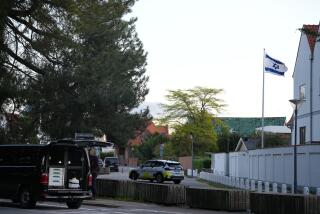6 killed in blast outside Danish mission in Pakistan
- Share via
ISLAMABAD, PAKISTAN — A car bombing that killed at least six people and wounded dozens of others Monday near the Danish Embassy raised fears that Al Qaeda-linked militants might be moving to fill a void left by other Islamist fighters seeking truces with Pakistan’s new government.
The powerful blast occurred just outside the embassy gates in a leafy, upscale neighborhood of Islamabad, the capital. The mission has been the target of angry protests over caricatures of the prophet Muhammad published in Danish newspapers.
It was the second bombing in less than three months aimed at foreigners or foreign interests in Islamabad.
The explosion, which could be heard across much of the normally tranquil city, shattered windows in the embassy building, left a deep crater in the road outside and wrecked dozens of vehicles parked nearby. Panicked neighbors ran into the street, calling for help.
The dead included two policemen, a janitor at the embassy and passersby, officials said. Most embassy personnel no longer work in the building, in the wake of protests this year after Danish newspapers reprinted the cartoons first published in 2005.
The force of the explosion, which came during lunch hour, twisted the embassy’s heavy metal gates and knocked down a section of the wall surrounding the building.
Ayman Zawahiri, Al Qaeda’s second in command, recently urged followers to strike at Danish targets over the cartoons. The blast, coming after weeks of relative calm in Pakistan, suggested that the government may remain vulnerable to such attacks even if it can make peace with so-called local Taliban militants.
Pakistan’s ruling coalition, led by the party of assassinated former Prime Minister Benazir Bhutto, condemned the attack. Officials, however, said they would not be deterred from negotiating with Islamic militants based in Pakistan’s tribal areas along the border with Afghanistan and elsewhere in the country’s volatile northwest.
Those talks have resulted in truce accords with some smaller militant groups but not with Baitullah Mahsud, the leader of the main umbrella group of Pakistani Taliban. Pakistani officials and the CIA have accused Mahsud, who is thought to have ties to Al Qaeda, of masterminding the Dec. 27 assassination of Bhutto, a charge he has denied.
Until now, groups like Mahsud’s have cited Pakistani government policies as a pretext for their attacks. Monday’s bombing suggested that wider Western interests also could be targeted.
U.S. officials have sought to give the recently elected leadership time to establish firm control over the country, even as it makes overtures to extremists in the tribal regions.
“This is still a new civilian government,” said Defense Secretary Robert M. Gates at a security conference in Singapore over the weekend. “We need to give them time to gain an appreciation of the range of challenges that they face and the nature of the challenge there in the northwest.”
But privately, Defense officials acknowledge some disagreement within the Pentagon over whether to press the new government to move more aggressively against Al Qaeda-linked fighters. Some officials are concerned about recent intelligence reports that suggest Al Qaeda is regaining its capabilities to strike beyond South Asia.
The U.S. Embassy urged Americans to exercise great caution when moving about in the capital after Monday’s blast, which damaged two nearby diplomatic residences. The area is heavily guarded, and most vehicles must have diplomatic plates to enter.
The explosion was so strong that the engine of the car in which the bomb was believed to have been planted was flung more than 100 feet, landing in a garden. The nearby office of a United Nations-funded group was evacuated, and more than 30 of its employees suffered cuts from flying glass.
Western news agencies quoted Danish Foreign Minister Per Stig Moeller as saying that no Danes were killed in the blast, though later reports said one victim might be a dual national with a Danish passport.
The last major attack on foreigners occurred March 15, when an explosion at a restaurant popular with expatriates killed a Turkish woman and wounded about a dozen others, including five FBI employees.
--
Special correspondent Zaidi reported from Islamabad and Times staff writer King from Istanbul, Turkey. Times staff writer Peter Spiegel in Singapore contributed to this report.
More to Read
Sign up for Essential California
The most important California stories and recommendations in your inbox every morning.
You may occasionally receive promotional content from the Los Angeles Times.










